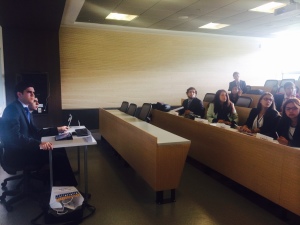You’ll probably remember your first Model UN experience. You’ll probably remember how intimidating it was to enter to a room full of strangers so properly dressed. But what you’ll remember for sure is that it was experience through which you developed your passion for Model UN.
Unfortunately, I’ve heard several stories about people who wanted be part of the Model UN circuit, but left as a result of an intimidating experience as a novice delegate.
As a chair, your mission is to make the conference an experience that attracts delegates to continue on the Model UN circuit and helps delegates develop their passion for Model UN.
1. Let your delegates know you were once a novice delegate: This is extremely important as you introduce yourself to the committee. This doesn’t mean telling them the whole story about your first conference, however, it is important to remind them how usual is to feel shy and let them know all those little problems we all faced in our first Model UN experience, without intimidating them. This is a good way to let your delegates know you can understand them and eliminate the typical novice delegate “superior ruler” view of his or her chair without disqualifying your authority as chair.
2. Know the topic as well as every country policy present in your committee better than any delegate: Although this might sound troublesome, it is key that you are able to provide your delegates with information about their policy at any moment. Novice delegates, especially during lobby time, experience difficulties with finding their main allies. Even though you probably know the main country policies such as the one of the United States with China, don’t expect this to be the only one being asked. The more you know about your topics as well as country policies, the better the learning experience you’ll be able to provide to your delegates.
3. Provide delegates with small recommendations before the committee: You’ll probably remember your first time as a delegate and the things the chair warned you of. From the beginning, be clear about the behavior and rules you expect them to follow throughout the committee. An example of a small recommendations to give to delegates before the committee includes a gentle reminder to avoid waving their placards or playing with them, as it will prevent you from constantly warning them. This recommendation would prevent you from turning into an annoying chair that nags the delegates constantly.
4. Identify and help delegates struggling with the committee: The more delegates debating throughout the committee, the better development the committee will have. Delegates facing different problems such as not being sure of their policy or not having a clear idea on how to intervene in the committee will not raise their placards during the whole debate. As chair, your mission will be to identify those delegates and ask them if there is anything you can help them with. Eliminating any issue which hold your delegates back from an intervention means there will be a larger participation in your committee.
5. Magnify their strengths, improve their weaknesses: All of us, as novice delegates, probably had no idea at all of what were we doing right or wrong. That knowledge is usually gained by attending more conferences over time. If you can help delegates to identify their strengths by congratulating them for the “voice tone he managed on his previous intervention” or instead suggest them “to give only one idea per intervention” will keep up their enthusiasm as well as will keep them improving throughout the conference.
6. Keep the balance: The chair of a dais is a position of authority. Even though it’s true that you need to make your delegates respect you, being extremely firm and strict with novice delegates would intimidate them. However, this does not mean giving them all your confidence and letting them do whatever they want with the committee. The ideal chair of every committee for novice delegates is the one that can keep the balance between authority and comprehension. If you are comprehensive enough with your delegates without losing your authority, they will trust you with their different problems throughout the committee, respect you and won’t feel intimidated by you.
7. Remind them M-U-N is F-U-N: Most of us, in our first conference, had no one who told us anything other than “attend a Model UN conference and win an award”. Nowadays, we all know that being a delegate goes beyond winning an award. Being a delegate is also an opportunity to learn new things, make new friends, improve your confidence and have fun. When your only goal was winning, you weren’t able to enjoy a conference as much as you could have, and probably ended up as enemies with the guy who didn’t vote for your resolution. Remember the different things delegates can obtain from the Model UN experience- awards aside, it is important to have fun. As a result, no matter how good or bad novices perform during their first conference, at least they’ll make the effort to enjoy it as much as they can, with your help.



